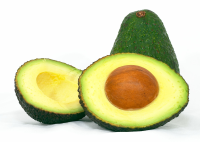Avocado
 Overview
Overview
Avocado, or Persea Americana, is an oval or pear shaped fruit with a green, meaty flesh and large pit. They are typically used in salads, dips, and sandwiches; in fact, they offer a healthier alternative to butter, cream cheese, or other condiments on sandwiches. While the Guatemalan, or Haas, avocado is the most popular in the United States, there are two other types of avocados: West Indian and Mexican. Each avocado thrives in a different climate. Guatemalan avocados grow best in a cool, high-altitude tropical climate; Mexican avocados thrive in a Mediterranean climate; and West Indian avocados grow best in humid, tropical climates. Hybrids of all three of these types of avocados are also available.
Avocados may weigh between one-half and three pounds. The Haas avocado has a bumpy, dark purplish-brown, thick skin and an oval shape, while the Mexican avocado is more pear-shaped with a smoother, dark green skin. While the “meat” of the fruit may be hard when it is first harvested, it softens and the skin darkens as the fruit ripens; an avocado will yield slightly to pressure when it is ripe. Avocados should be kept at room temperature until they are ripe; thereafter, they will last for about one week in the refrigerator if left whole and only about one day in the refrigerator if sliced or cut. The flesh of avocados tends to darken when exposed to air; such a reaction may be prevented by sprinkling it with vinegar or lemon juice.
History of Avocado
Avocados have been grown since about 8,000 B.C., originally in Central and South America. Mayans and pre-Incan races were the first people to cultivate the fruit. In the mid-1600s avocados were brought to Jamaica; they spread throughout Asian tropical regions by the mid-1800s. It was not until the early 1900s that avocados began being grown in the United States, primarily in California and Florida. The primary producers of avocados throughout the world are the United States, Mexico, the Dominican Republic, Colombia, and Brazil. About eighty percent of the United States’ avocados are grown in California.
Nutritional Information
Although avocados are high in calories and fat content, they offer many nutritional and health benefits. An average size avocado has about 300 calories. While it may contain about 30 grams of fat, this fat is primarily healthy fat; that is, about 20 of the 30 grams of fat are monounsaturated fat, about six grams are polyunsaturated fat, and only about four grams are saturated fat. An average avocado also provides about four grams of protein, 12 grams of carbohydrates, and about 12 to 13 grams of fiber. Avocados are high in potassium, containing about two to three times the amount of potassium contained in one banana. They are good sources of most of the B vitamins and contain Vitamins E, C, and A, and folic acid, niacin, magnesium, iron, and manganese, as well.
Health Benefits of Avocado
Avocados provide a variety of health benefits. The fruit has high beta-sitosterol content, which is linked to lower levels of LDL cholesterol, the “bad” cholesterol. One study showed that people who ate avocados every day for seven days reported higher levels of HDL cholesterol, the “good” cholesterol, in addition to significantly lower levels of LDL cholesterol and triglycerides. Furthermore, the potassium, folate, and glutathione found in avocados may help lower the risk of developing high blood pressure and stroke.
Avocados may also be cancer-fighting fruits. The fruit contains glutathione, which helps protect the body from damage caused by free radicals, which in turn, protects the body from diseases such as cancer and heart disease. The phytochemicals in avocados have been shown to prevent growth of and actually kill cancer cells, an action that would in turn prevent the development of cancer. More specifically, the cartenoids and tocopherols found in avocados have been shown to help prevent the growth of prostate cancer cells.
Finally, avocados may actually help improve physical appearance. In general, Vitamin E, which is contained in avocados, helps slow the effects of aging on the skin. Also, the oils found in avocados are linked to increased collagen production; an increase in collagen can improve the texture of skin and also reduce wrinkles.
While there are many health benefits to eating avocados, they can be somewhat harmful to people who suffer from latex allergies. Avocados contain chitinases, which can cause allergic reactions in people with latex allergies. In turn, people with such allergies should avoid eating and handling the fruit.
References
- Holford, P. The optimum nutrition bible, Little Brown Group (2004)
- Holford, P & Lawson, S. Optimum Nutrition Made Easy How to achieve optimum health, Piatkus Books (2008)
- Murray, M.T. et al., Encyclopedia of healing foods, London : Piatkus (2005)
- The National Research Council. Recommended Dietary Allowances, 10th ed, National Academy of Sciences (1989)
- Werbach, M. Nutritional Influences on Illness, 2nd ed, Third Line Press (1993)
Posted in Avocado
Ask a Question Or Join a Discussion


